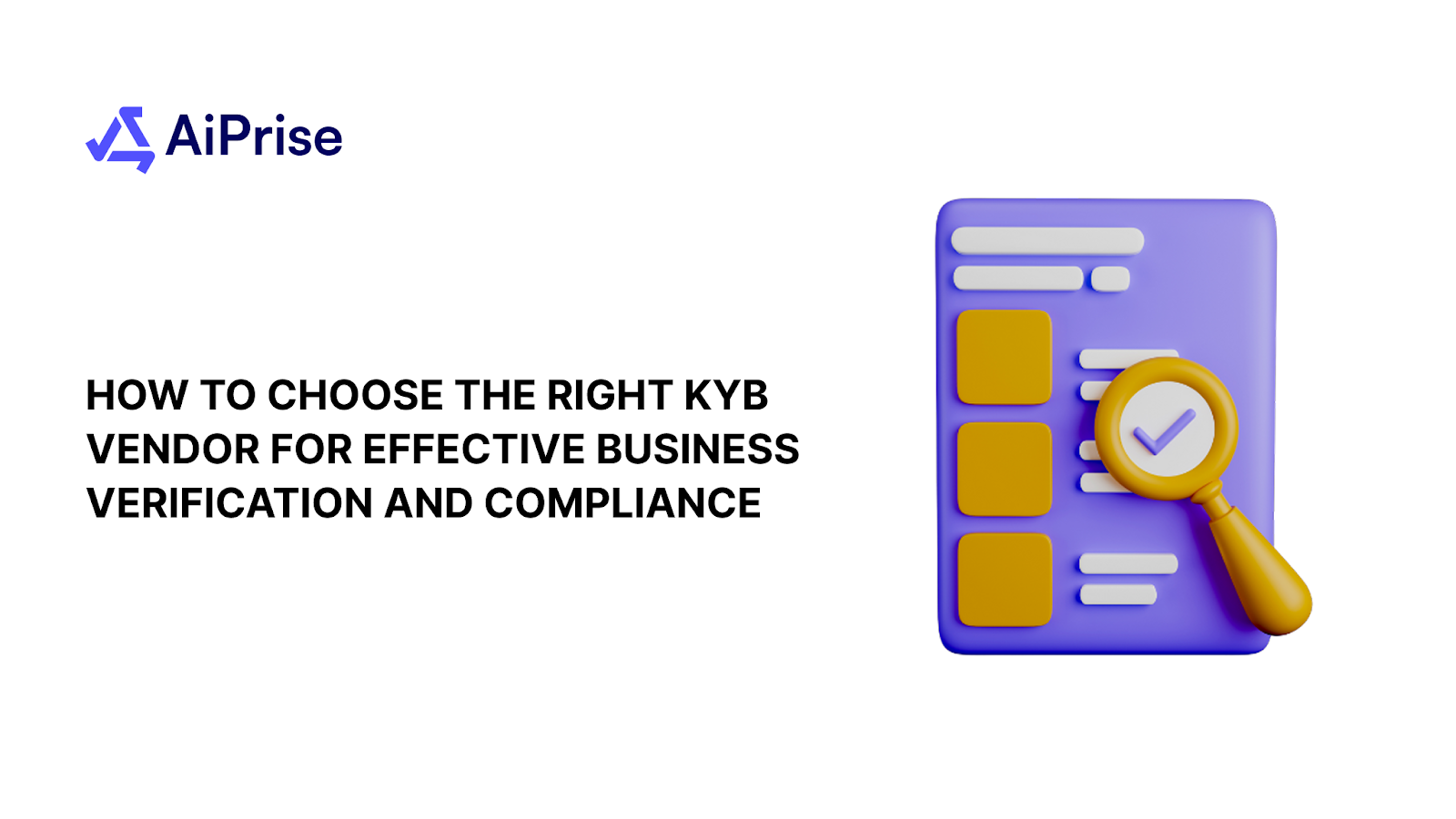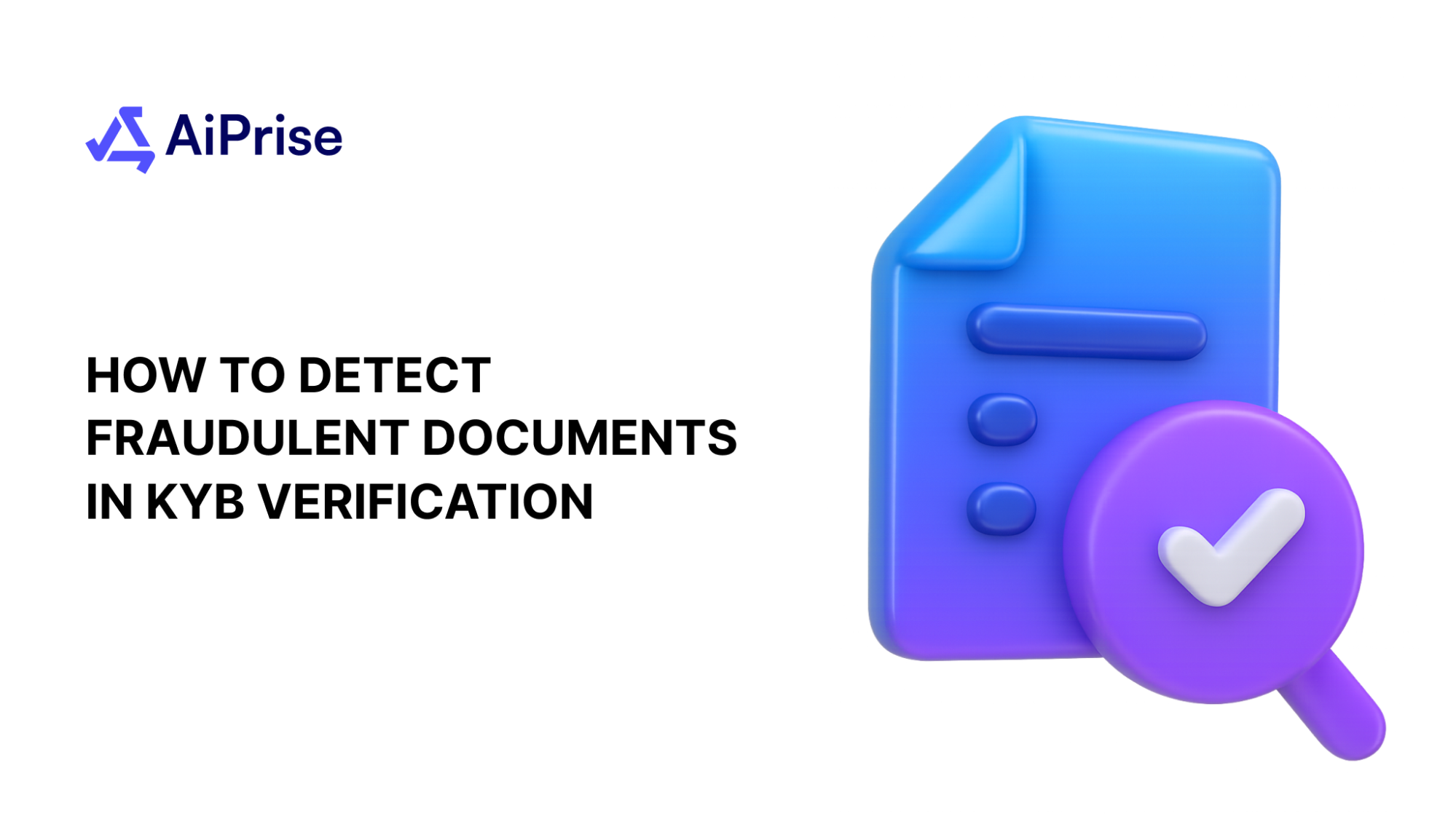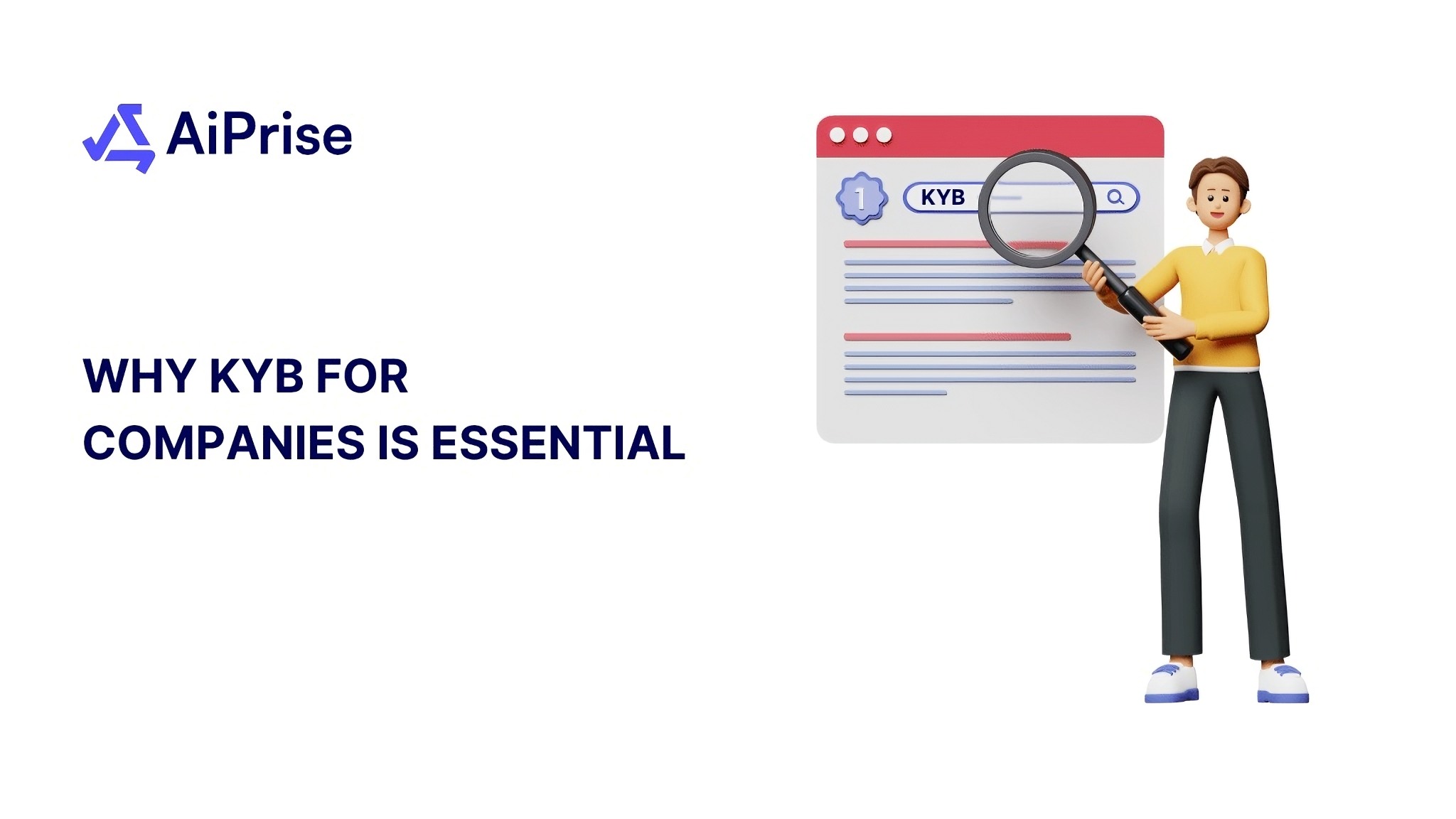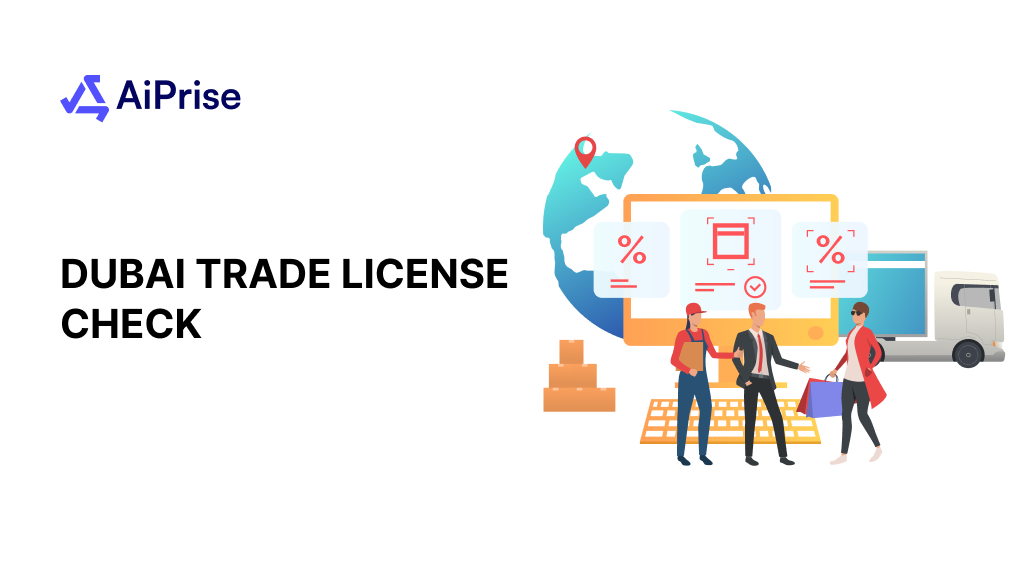AiPrise
19 mins read
August 13, 2025
How to Spot a Fake Singapore Company: A Guide to Identifying Business Scams
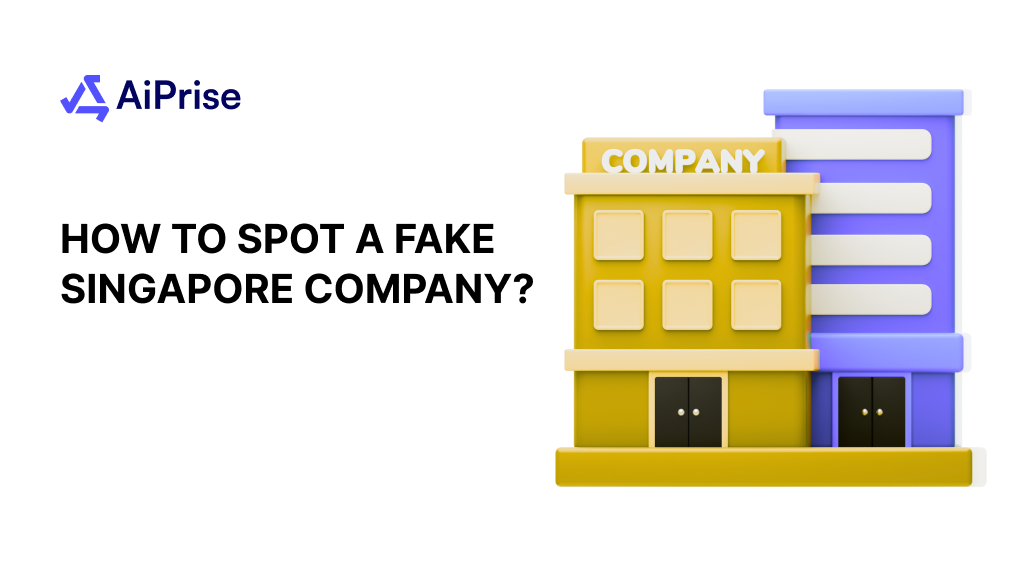
Key Takeaways










When considering a new business partner or supplier in Singapore, performing a Singapore company name check is crucial. With over 450,000 registered companies as of July 2025, Singapore’s business landscape is bustling. But how can you be sure that the company you're engaging with is legitimate?
Many businesses, especially those new to the market, struggle to verify the authenticity of a company before making significant investments. Without proper verification, you risk wasting time and money on potentially fraudulent or unreliable businesses.
In this article, you’ll walk through the essential steps to perform a thorough company check, ensuring that you only engage with trustworthy partners.
In a Nutshell:
- Fraudulent companies are becoming harder to spot, using fake registrations and misleading details to deceive businesses.
- Singapore company name checks help verify a company's legitimacy and registration status, protecting your business from scams.
- AiPrise offers advanced verification tools that cross-check data from multiple trusted sources, ensuring you only partner with legitimate companies.
- Protect your business by using real-time checks, document validation, and financial history reviews before entering into any new partnerships.
Key Indicators of a Fake Singapore Company
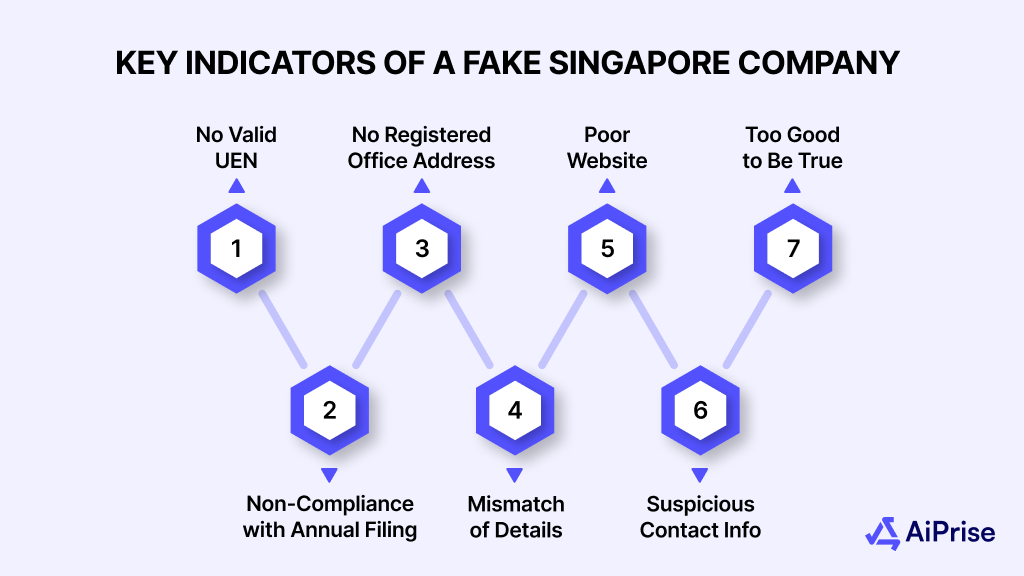
Suppose you’ve found what seems like the perfect supplier in Singapore. Their products look great, their website is sleek, and the pricing is just right. You’re ready to sign the deal. But before you move forward, you decide to run a quick Singapore company name check. Turns out, the company isn’t even listed in the official registry.
This scenario happens more often than you might think. With so many companies in Singapore, it’s easy to get caught up in the excitement of a potential partnership without doing the necessary checks.
Below are key indicators that can help you spot a fake company:
No Valid UEN (Unique Entity Number) or Company Not Found on ACRA
The UEN is the unique identifier for companies in Singapore, issued by the Accounting and Corporate Regulatory Authority (ACRA). It's a critical piece of information that verifies a company’s legitimacy. Without a valid UEN, a company cannot be legally recognized or registered in Singapore.
When engaging with a potential business partner, checking their UEN is one of the first things you should do. If a company doesn’t have one, it’s a major red flag.
To check a company's UEN, follow these simple steps:
- Go to the ACRA website: Visit the official ACRA portal.
- Use the 'BizFile+' Service: Search for the company using their name or UEN number.
- Verify the UEN: If the company is listed, you’ll be able to see the registration details, including the UEN. Ensure the UEN is valid and corresponds with the company’s name and details.
- Check Status: Confirm that the company’s registration status is active. An inactive status could also signal potential fraud.
A company without a valid UEN raises several serious concerns:
- Non-existent entity: The company might not exist in the official business registry, indicating it could be a ghost entity created for fraudulent activities.
- Risk of legal and financial issues: If the company isn't registered with ACRA, any contracts you sign with them might not be legally binding, leaving you with no recourse.
- Potential for fraud: Companies without a UEN often don't comply with regulations, making them prime candidates for scams or illegal activities.
- No recourse: Without a proper UEN, you have no legitimate entity to pursue legally if things go wrong, like when products are not delivered or services are subpar.
Non-Compliance with Annual Filing and Regulatory Requirements
In Singapore, all registered companies are required by law to comply with annual filing and regulatory requirements. This includes submitting financial statements, updating company information, and filing taxes on time. If a company neglects these obligations, it signals a lack of discipline and possibly a deeper issue with the business’s legitimacy.
Non-compliance can also suggest that the company might be cutting corners or hiding something, either of which can lead to trouble down the line. As a business, ensuring your partners stay up to date with these requirements is crucial for minimizing risks.
Here’s how you can verify if a company is up to date:
- Visit ACRA’s BizFile+ Portal: Go to the official ACRA BizFile+ portal.
- Search for the Company: Use the company’s name or UEN to find their filing history.
- Check Filing Status: Review their filing status, look for any overdue filings or missing annual returns.
- Verify Compliance with Financial Reports: Ensure that their financial statements have been filed and are up to date.
Failure to comply with annual filings and regulatory requirements can result in serious consequences for your business partnership:
- Fines and Penalties: A company that fails to file necessary documents on time may face fines from ACRA, which could damage its financial standing.
- Loss of Good Standing: Non-compliance could result in the company losing its ability to conduct business legally in Singapore.
- Potential Closure: A company that consistently fails to comply with regulatory requirements may eventually be struck off the register, leaving you with no recourse for any agreements or transactions.
- Operational Risk: Without timely filings, the business could be facing internal issues, such as cash flow problems or mismanagement, that you would want to avoid.
No Registered Office Address or Use of a Suspicious Address
A legitimate business in Singapore is required to have a registered office address. This physical address is not just for correspondence; it establishes the company’s presence and credibility.
If a company lacks a clear registered office address, or if the address appears unusual (like a P.O. box or a residential address), it could be a sign that they’re operating in a non-transparent manner.
Here’s how to confirm the authenticity of a company’s address:
- Check ACRA’s BizFile+ Portal: Use the official BizFile+ service to search for the company’s registered office address.
- Cross-Reference Address on Their Website: Ensure that the business address provided on the company’s website matches the one found in official records.
- Search Third-Party Databases: Look up the company’s address on platforms like Singapore Business Directory or other reputable business registries.
- Check Google Maps: Search the address on Google Maps. If the address doesn’t exist or leads to a residential or non-business location, proceed with caution.
- Ask for a Physical Visit: If in doubt, ask for a meeting at their listed office. A genuine business should be open to in-person discussions at its office.
Operating without a valid registered address can expose you to a range of risks:
- Shell Company Risk: A company with no registered address may be a shell company created to evade taxes, regulations, or illegal activities.
- Legal and Compliance Issues: Without a physical address, the company may not comply with local regulations, and you’ll have trouble holding them accountable in case of disputes.
- Limited Legal Recourse: If something goes wrong, having no clear address makes it difficult to take legal action or recover damages.
- Difficulty in Verification: A suspicious or unverifiable address makes it harder to verify the company's legitimacy and operational capacity.
- Risk of Disappearing: Without an address, there’s a higher chance the company could disappear overnight, leaving you with no way to contact or claim damages.
Mismatch of Details Across Public Records and Company Materials
Inconsistent or mismatched company details across public records, marketing materials, and other business documents should raise a red flag. When company information such as addresses, directors, or business activities doesn't align with official records like ACRA, it signals that the company may not be operating transparently.
For businesses, accurate and consistent information is essential for building trust with partners, clients, and investors. Discrepancies often point to a lack of internal control or potential fraudulent activities, which can expose your business to unnecessary risks.
To ensure the company’s details are consistent, follow these verification steps:
- Review Public Business Listings: Compare the company's details with reputable business directories such as the Singapore Business Directory.
- Compare Marketing Materials: Cross-check company documents like brochures, websites, and contracts for consistency with official registration records.
- Check Social Media Profiles: Ensure that the company’s contact details, addresses, and other business-related information on social media match official sources.
- Request Updated Documentation: If there are discrepancies, ask the company to provide official, updated documentation to clarify the issue.
Dealing with a company that has inconsistent or mismatched information can lead to several business risks:
- Increased Fraud Risk: Mismatched details can indicate fraudulent practices, such as misrepresentation of the company's true identity or activities.
- Difficulty in Legal Actions: Inconsistent details make it harder to pursue legal recourse in the event of a dispute, as the company might not be traceable or identifiable.
- Loss of Trust and Reputation: Working with companies that cannot keep their records straight could damage your business’s reputation and trust with clients or investors.
- Potential for Contractual Disputes: Discrepancies in key company details can lead to confusion or misinterpretation of contractual obligations, increasing the risk of breach or legal conflicts.
- Non-compliance: Inconsistent records may suggest the company isn’t complying with local regulations, which could affect its ability to operate legally.
Unprofessional or Poorly Constructed Website
A poorly designed or incomplete website is often a sign of a company that lacks professionalism or is potentially fraudulent. A legitimate business understands the importance of presenting itself professionally online. If a website is hard to navigate, has broken links, lacks clear contact information, or contains outdated content, it raises concerns about the company’s credibility.
Moreover, scam companies tend to create low-quality websites that do not offer essential details, which can mislead businesses into thinking they’re dealing with a legitimate entity.
Here’s how to assess the professionalism of a website:
- Check for Contact Information: A legitimate business should provide a physical address, phone number, and email address on its website. Ensure these details match official company records, like ACRA.
- Review Business Offerings: The website should clearly outline the company’s products or services. Vague or generic descriptions might be a red flag.
- Verify Secure Payment Methods: Ensure that the website uses secure payment gateways (look for "https" in the URL and payment security certifications) if you're expected to make purchases or transactions online.
- Assess Website Design and Functionality: Look for a clean, professional design. Poor grammar, broken links, or images that don’t load could signal a lack of attention to detail, which is common with fraudulent websites.
- Check for Privacy Policies or Terms & Conditions: A reputable company will always include these important legal details to protect both parties involved.
Working with a company that has an unprofessional or poorly constructed website can expose your business to several risks:
- Increased Risk of Scams: Poorly designed websites are often associated with fraudulent companies trying to steal personal or financial information.
- Lack of Customer Support: An unprofessional site might not provide adequate contact information, making it difficult to get support if there’s an issue with a product or service.
- Potential Financial Losses: Insecure websites without secure payment systems can lead to unauthorized transactions, exposing your company to financial loss and fraud.
- Misrepresentation: A subpar website might misrepresent the quality or legitimacy of the company’s offerings, leading to confusion or dissatisfaction with services provided.
- Damage to Your Business's Reputation: Associating with a company that has an unreliable online presence can hurt your business’s own credibility, especially if customers or partners become suspicious.
Suspicious Contact Information or Reluctance to Provide Details
A legitimate company should have transparent, easily accessible contact details. If a business is reluctant to share basic contact information like a phone number, email address, or physical office address, it’s a major red flag.
If you’re encountering difficulty obtaining contact details, be cautious; it could mean the company is trying to hide its identity or avoid being traced.
Here’s how to check if a company’s contact details are legitimate:
- Call or Email the Company: Try reaching out to the company via the provided contact details. A legitimate business should respond promptly and professionally.
- Verify Contact on Multiple Platforms: Check if the company’s contact information is consistent across different platforms, such as their website, business listings, or social media profiles.
- Look for Contact in Official Documents: Ensure the company’s contact details are present in contracts, invoices, or other business-related documents.
- Request a Meeting or Call: Ask for a direct meeting or phone call with a representative. Reluctance to provide direct contact should raise immediate concerns.
- Check for Validity of International Numbers: If the company lists a phone number from another country, verify if it's a valid and working contact.
If you are dealing with a company that is unwilling to provide clear contact details, you risk several potential business problems:
- Scammers Evading Scrutiny: Fraudulent businesses often avoid contact to delay or deter further investigation. If you can’t easily reach a company, it’s a warning sign that they might be hiding something.
- Difficulty in Resolving Issues: If there’s no clear point of contact, resolving issues like payment disputes, delivery delays, or service problems becomes much harder.
- Unreliable Communication: A lack of accessible contact details often means that the company may be unreliable when it comes to communication, which is vital for smooth business transactions.
- Legal and Compliance Risks: Without valid contact information, you may struggle to take legal action or resolve contractual disputes, especially if something goes wrong in the partnership.
- Risk of Fraudulent Transactions: In some cases, scammers will give fake contact information to steal money, products, or services without any way for you to follow up or take action.
Pressure Tactics, Unusual Payment Requests, or Offers Too Good to Be True
One of the most significant warning signs of a fraudulent company is the use of pressure tactics or offers that sound too good to be true. If a business is pushing you to make decisions quickly, promising massive returns with little risk, or insisting on unusual payment methods, it’s time to be cautious.
Scammers often use high-pressure sales techniques to rush victims into making hasty decisions without due diligence. Additionally, offers that promise far more than the market norm, such as "limited-time" deals or discounts, can often hide ulterior motives.
Here’s how to protect your business from fake deals and risky offers:
- Research Market Rates: Before accepting any deal, ensure the terms and prices are in line with what’s standard in your industry. If an offer seems too lucrative, it’s worth questioning.
- Ask for Time to Think: A legitimate company will allow you time to review the offer and make an informed decision. Scammers often push for immediate commitment, using phrases like “limited-time” or “act now.”
- Verify Payment Methods: Be cautious of companies demanding upfront payments via unconventional methods (e.g., wire transfers, cryptocurrencies, gift cards). Legitimate businesses typically accept more secure, traceable payment methods.
- Check for Online Reviews or Testimonials: Look for independent reviews or feedback from other businesses that have dealt with the company. If you find a lack of reviews or vague, generic feedback, it’s a red flag.
- Request Contract Terms: Always ask for clear contract terms, including the scope of services, deliverables, and payment schedule. Unclear or vague contracts are often used to disguise fraudulent intentions.
If you fall for pressure tactics or offers that are too good to be true, your business faces several potential risks:
- Financial Scams: Scammers often target businesses with fake offers or pressure to secure payments before disappearing with your money.
- Advance-Fee Fraud: Scammers may request an upfront payment for services or products that never materialize, leaving you with no recourse.
- Stolen Personal Information: Unusual payment requests or fake deals often involve attempts to steal sensitive company data or financial information, which can be used for identity theft or fraudulent transactions.
- Damage to Business Relationships: Agreeing to terms under duress or without due diligence can lead to poor business decisions, damaging your company's reputation and partnerships in the long run.
- Legal Consequences: If the deal turns out to be a scam, your company may find itself involved in legal disputes or financial losses with no way to recover the funds or damages.
Now that you know how to spot the warning signs of a fraudulent company, let’s explore the steps you can take to safeguard your business from falling victim to these risks.
How to Protect Yourself from Fraudulent Companies
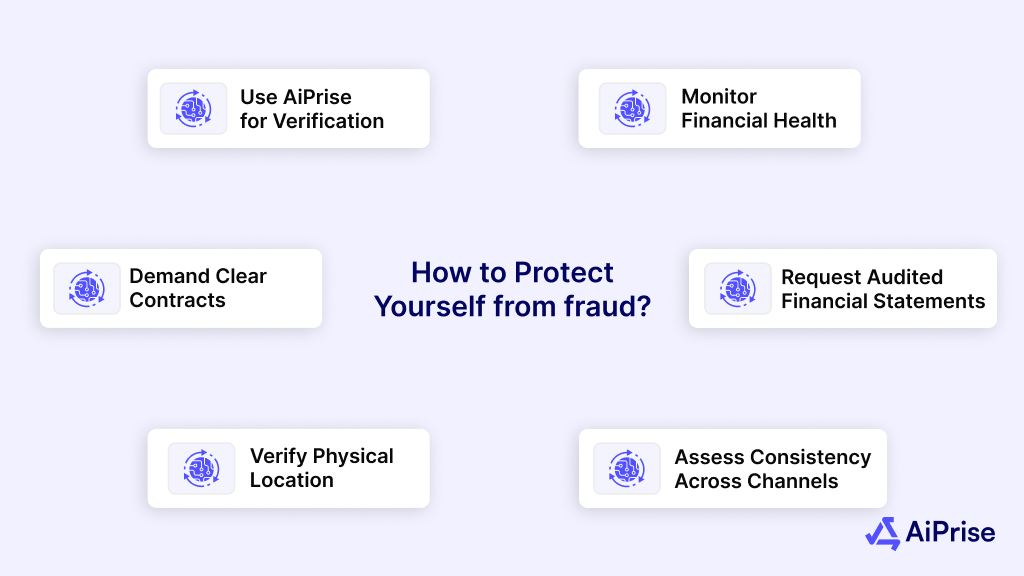
Protecting your business from fraudulent companies is essential for safeguarding your reputation and minimizing risks. For instance, conducting a thorough Singapore company name check can quickly reveal whether a business is officially registered or a potential scam.
Below are a few steps you can take to protect your business from fraudulent companies:
1. Use AiPrise for Advanced Verification:
As a business, you need to be certain your partners are legitimate. AiPrise offers a robust business verification tool that checks company registration status, ownership details, and compliance history.
For example, if you're considering a supplier in Singapore, AiPrise can quickly verify whether they are listed with ACRA and provide real-time risk scoring. This step is crucial in preventing future disputes or loss of business.
2. Monitor Financial Health Through Third-Party Platforms:
Regularly assessing the financial stability of your partners is critical. Platforms like Dun & Bradstreet provide credit reports that can reveal any red flags, such as frequent late payments or a history of bankruptcies.
For instance, if you're working with a foreign supplier, a weak credit score can indicate they're struggling financially, and continuing the partnership could put your operations at risk.
3. Demand Clear and Transparent Contracts:
If the terms of a deal are unclear or vague, it could indicate that a company is trying to hide something. Always insist on detailed, legally binding contracts. For example, if you're entering into a distribution agreement, make sure it includes delivery timelines, product specifications, and payment schedules.
A fraudulent company may avoid putting these details in writing, hoping to manipulate terms later on.
4. Request Audited Financial Statements:
For larger investments or long-term partnerships, always ask for the company’s audited financials. A legitimate company will be transparent about their finances. If, for example, a tech firm you're considering for a long-term partnership refuses to provide audited accounts, it may be because their books are not in order or they’re hiding financial instability.
5. Verify Physical Location with Site Visits:
Don't rely solely on the company’s website or email contact for location verification. For instance, if you're contracting with a construction company, a visit to their listed office can confirm their operations. If they hesitate or make excuses about meeting in person, this could be a sign they are not operating from the claimed location, or worse, not operating at all.
6. Assess Consistency Across Digital Channels:
Cross-check information on the company's website, social media, and third-party business directories. If, for example, a company’s website lists one set of contact details but its LinkedIn profile or online reviews feature different phone numbers or email addresses, this inconsistency can signal potential fraud.
A legitimate company ensures all digital platforms reflect accurate and matching information.
As a business, your reputation and resources are critical. By following these actionable steps and performing a Singapore company name check, you can lower the risk of scams. This ensures you build partnerships with credible, reliable companies.
How AiPrise Helps Businesses Prevent Fraudulent Company Partnerships
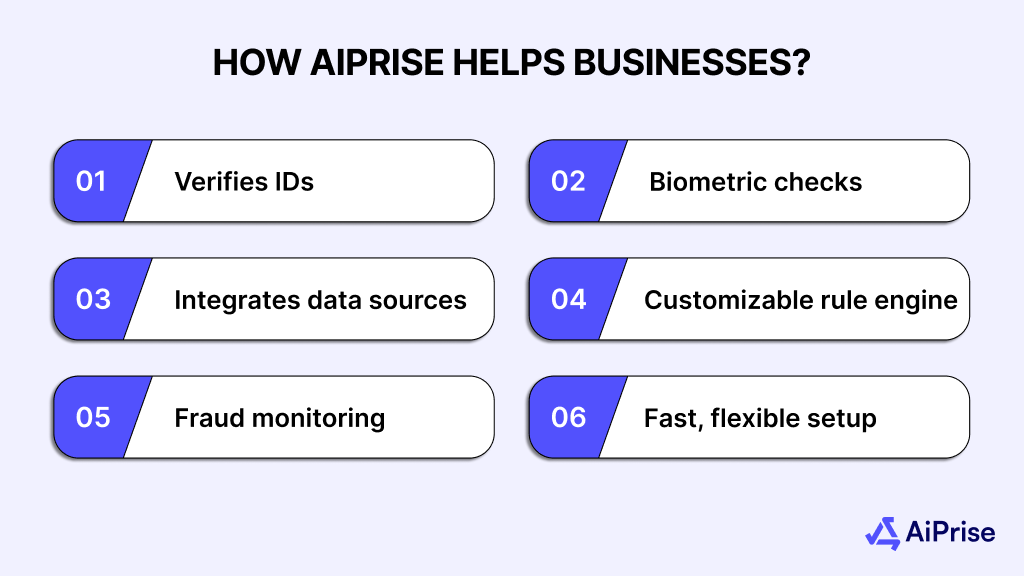
AiPrise provides a reliable identity verification platform designed to handle large volumes, meet regulatory standards, and protect against sophisticated fraud.
Here’s how it stands out in enabling secure and efficient digital onboarding:
- Verifies IDs from 200+ countries in under 30 seconds with AI-driven OCR, barcode/MRZ scanning, and enhanced security feature checks for over 12,000 document types.
- Performs biometric checks (facial recognition, liveness detection) to prevent spoofing, deepfakes, and synthetic identity fraud.
- Integrates with 800+ data sources for instant cross-referencing against government, credit, and sanctions lists, ensuring global KYC and KYB compliance.
- Customizable rule engine and risk scoring: Tailor onboarding flows and risk thresholds, automating low-risk approvals and escalating high-risk cases for review, reducing manual review time by up to 95%.
- Continuous fraud monitoring: Real-time alerts, adverse media scans, and ownership checks mean your systems don’t stop at onboarding. AiPrise helps you track identity risk as it changes.
- Fast, flexible setup: With white-label UI, API and SDK support, and multi-language capability, AiPrise can go live in days, without disrupting your current flow.
AiPrise helps you verify identities, spot fraud, and stay compliant all in one place, without slowing things down.
Conclusion
Effective company verification is key to preventing fraud before it affects your business. With the right tools, like a Singapore company name check, you can identify red flags early, meet regulatory requirements, and engage with reliable partners seamlessly.
It’s not just about due diligence; it’s about safeguarding your business from scams and staying one step ahead of potential risks.
Want to strengthen your business verification process and cut fraud risks? Book A Demo with AiPrise to see how the platform fits into your workflow and helps you stay secure and compliant.
FAQs
1. What is a Singapore company name check?
A Singapore company name check is a process where a business verifies a company's registration status and legitimacy through the official ACRA database. It ensures that the company is legally registered and operating within the regulations set by the Singapore government.
2. How can a Singapore company name check protect my business?
By conducting a Singapore company name check, you can identify fraudulent or non-existent companies before engaging in business with them. It helps prevent financial losses, legal issues, and potential scams by ensuring you only partner with legitimate, trustworthy entities.
3. What should I do if a company doesn't appear in the Singapore company name check?
If a company doesn't appear in the Singapore company name check, it's a red flag. This could mean the company is not registered or could be using fake details. In such cases, you should avoid proceeding with any partnership or investment until further verification is done.
4. How often should I perform a Singapore company name check?
It’s best to conduct a Singapore company name check whenever you are considering a new business partnership, supplier, or investment. Regular checks can help protect your business from evolving threats and ensure your partners remain compliant over time.
5. Can a Singapore company name check reveal if a company is involved in fraud?
Yes, a Singapore company name check can help identify discrepancies in a company’s registration details, such as inconsistencies in the UEN number or status. These inconsistencies often signal a potential fraud risk.
6. How does AiPrise help with verifying businesses in Singapore?
AiPrise offers advanced verification tools to cross-check company details from multiple trusted sources. By integrating AiPrise’s services with a Singapore company name check, businesses can further enhance their due diligence process, ensuring that they’re partnering with legitimate companies.
You might want to read these...

AiPrise’s data coverage and AI agents were the deciding factors for us. They’ve made our onboarding 80% faster. It is also a very intuitive platform.










.jpg)







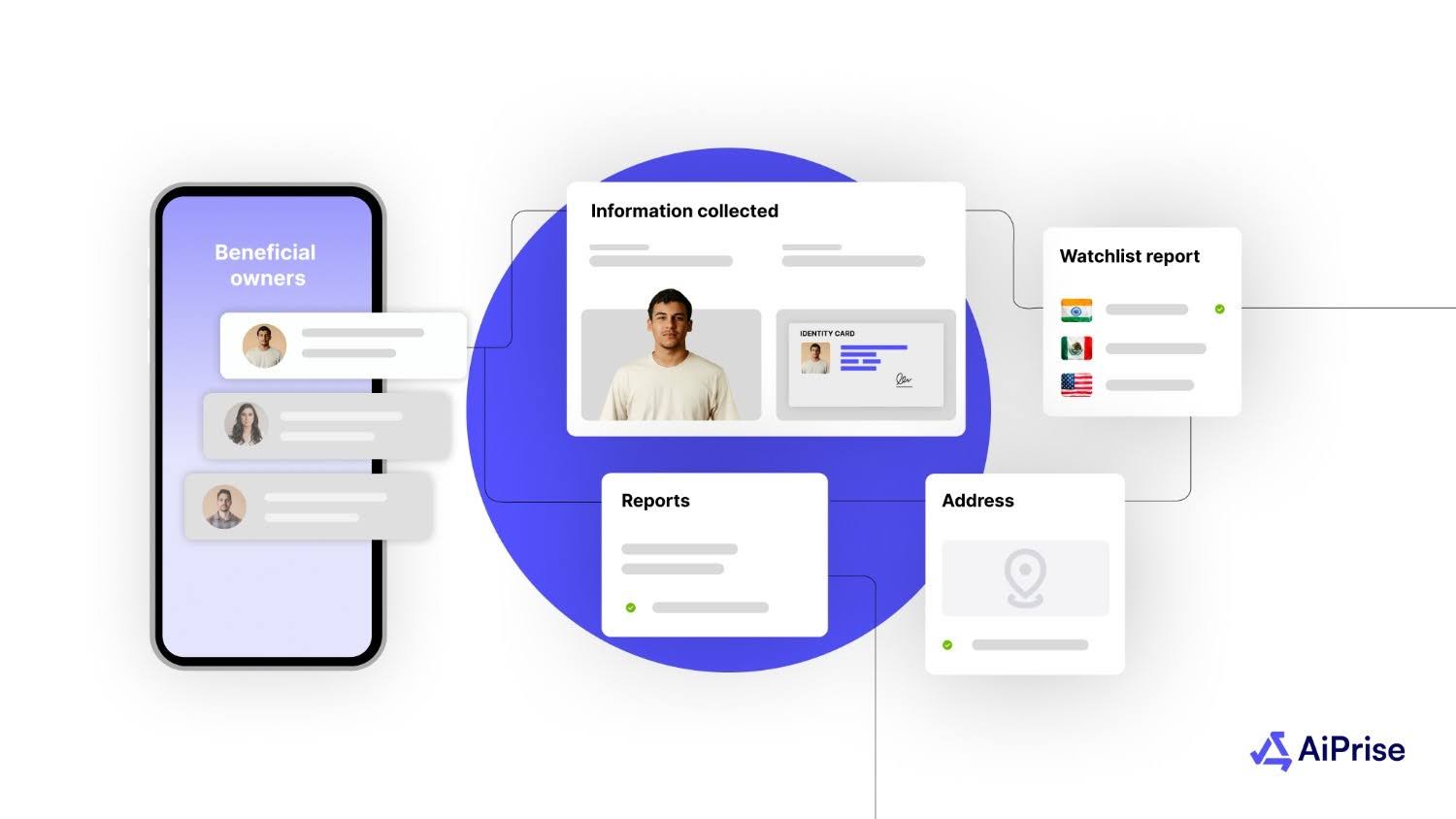
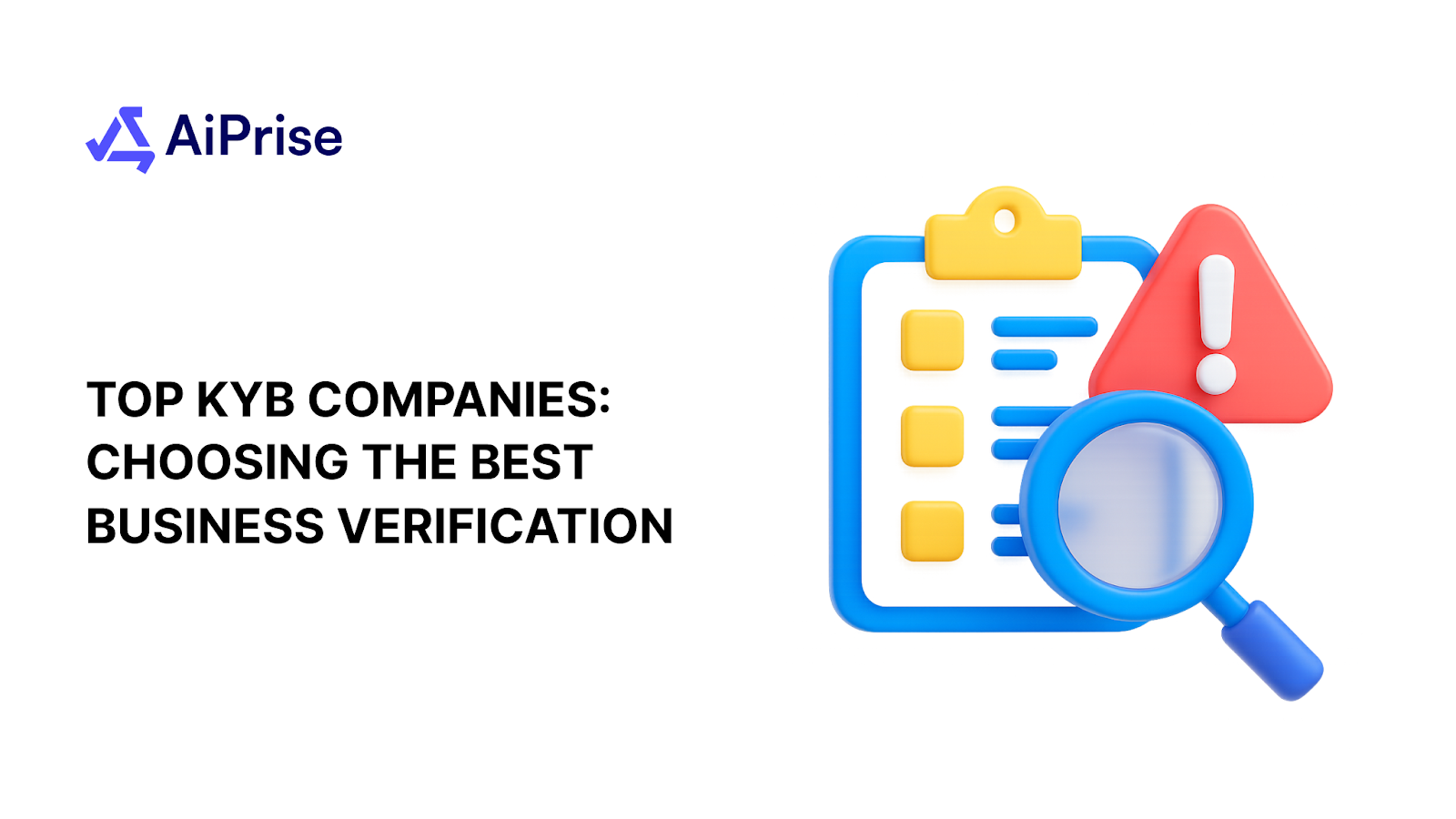
%20Can%20Improve%20Your%20Compliance%20Strategy.png)
